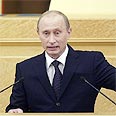
Syria’s rebels blame Russia’s Putin for prolonged fight
Moscow seen as struggling for relevance as its Mideast grasp slips away
Throughout rebel-held territory, Syrians have little faith that Moscow’s efforts to end the war, now in its third year, will bear fruit. Many believe Putin is backing Assad merely to spite the United States. Others, however, claim geo-political factors are behind the move. But all seem to have nothing but contempt for Russia and the role it is playing in the Syrian civil war.
Related stories:
- Putin, Kerry review Syria, Israel situation
- Putin taught Bibi a lesson
- Will Israel destroy Russian missiles?
Faris Samir guided a foreigner through the rubble in the village of Kafr Nabil in the northern province of Idlib. For months the regime shelled the hamlet and launched air strikes from the nearby Taftanaz air base. Not much remains of the peaceful village. “You see these buildings,” the 34 year old teacher tells The Media Line while motioning at a heap of thick blocks. “They were the work of gifts the Russians gave Bashar.”
Members of the rebel-led Free Syrian Army (FSA) often complain that the casualties they take are the result of Russian weapons. From tank shells to fighter planes, Russia supplies Syria with virtually all of its weaponry. “We can’t fight a regime that has the latest helicopters and canons when all we have are hunting rifles,” complained 24-year old fighter Ahmad Jabri near Aleppo’s old city recently where he was fighting. “Russia needs to understand its weapons are killing us.” Last week, Moscow upped the stakes by sending Damascus advanced cruise missiles that could be used to thwart a Western naval blockade.
Many Syrians are puzzled at why Russia is propping Assad up. Some believe Moscow is merely trying to remain relevant in a post-Cold War era. “Putin needs to be able to say he stood up to (US President Barack) Obama,” 46-year old engineer Salih Mustafa explained to The Media Line in al-Bab. “He is turning Syria into a graveyard to do it.” Mustafa and others hold that Putin wants Obama to beseech him for help to illustrate his global importance to his Russian constituents. “Putin is playing a game with Obama,” noted Tamir Riyad, 35, outside of an Aleppo mosque. “He is showing his people how tough he is.”
Others, however, believe Russia has much more at stake in Syria than mere machismo. Syria hosts a Russian naval base in Tartus which gives Russian war ships a port-of-call in a Mediterranean Sea otherwise dominated by America’s Sixth Fleet. For years, the Russians operated a naval base in the Egyptian city of Alexandria until the late Egyptian President Anwar Sadat expelled the Soviets in 1972. Losing its last foothold in the Mediterranean would cost Russia dearly.
Moreover, following the fall of Iraqi President Saddam Hussein in 2003 and Libyan leader Mu’ammar Qaddafi last year, Russia has precious few friends remaining in a region otherwise dominated by American allies. For these reasons, Moscow needs to ensure Assad’s grip on power in order to retain its regional influence. “The Russians are the big loser in the Arab Spring,” explained an Aleppo University professor reluctant to give his name to a foreign publication. “If Assad falls, they will have nothing left here. It will all be American flags.”
Russians have never been very popular with Syrians. During an Islamist rebellion in the 1980s they were targeted by the insurgents for supporting the regime. Pale Americans often complained that Syrians, mistaking them for Russians, jeered at them in the streets.
For these reasons, many here are quick to write-off Russian mediation efforts. They doubt a Russian government hanging steadfastly in Assad’s corner will do much to nudge him to end the war. “The Russians need to respond to pressure,” explained the professor. “They have no intention of actually playing a positive role.” And as long as they do, the blood will continue to flow in a revolution with no end in sight.
Article by Michel Stors
Reprinted with permission from The Media Line
- Receive Ynetnews updates directly to your desktop










